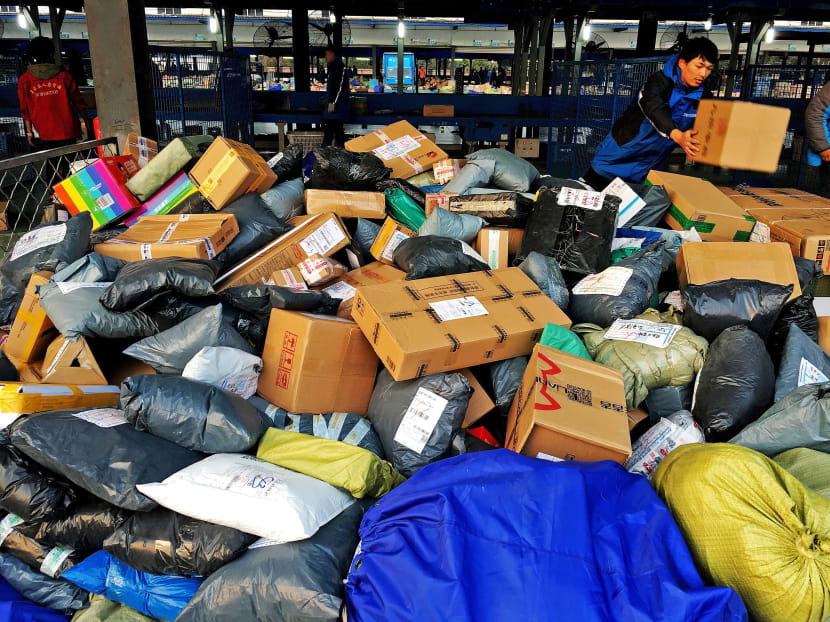China’s shopping craze turns into environmental nightmare
BEIJING — China’s Singles Day, the world’s biggest shopping extravaganza that fell on Nov 11, saw bargain hunters spend 10 billion yuan (S$2.07 billion) in just seven minutes on the country’s largest online-shopping site, Alibaba’s Tmall, last Friday after midnight.

An employee sorting parcels at a ZTO Express logistic centre during the Alibaba 11.11 global shopping festival, in Beijing last Friday. Employees of waste-disposal and recycling firms say that the spending orgy on China’s Singles Day could choke landfills and take a huge toll on the environment. Photo: REUTERS
BEIJING — China’s Singles Day, the world’s biggest shopping extravaganza that fell on Nov 11, saw bargain hunters spend 10 billion yuan (S$2.07 billion) in just seven minutes on the country’s largest online-shopping site, Alibaba’s Tmall, last Friday after midnight.
But the spending orgy could choke landfills and take a huge toll on the environment, employees of waste-disposal and recycling firms say.
China’s version of the United States’ Black Friday will result in one billion parcels travelling from retailers to customers’ doorsteps over the course of the next few weeks, according to the China Express Association (CEA).
But the country recycles less than 20 per cent of its packaging waste, Beijing Institute of Graphic Communication researcher Zhu Lei told Caixin. Only half the amount of all cardboard waste, the primary material in most delivery boxes, is recycled, while plastic foam and plastic are almost never processed.
China’s waste-recycling industry has grown at a snail’s pace, while e-commerce has taken off in recent years because of cheap delivery services and changing purchasing habits among young tech-savvy consumers.
China’s State Post Bureau calculated that retailers would have sent out a total of 30 billion delivery boxes over the course of this year. If each box weighs half a kilogramme on average, this adds up to about 1.5 billion tonnes of cardboard — and most of it will end up in landfills.
The lack of coordination between municipal governments in charge of garbage collection and private recycling firms has worsened the problem. Currently, recycling firms buy waste from private collectors, and garbage collected by local governments ends up in incinerators or landfills.
A waste-sorting policy drafted in June by the National Development and Reform Commission (NDRC), the country’s top economic planner, includes plans to introduce standards for collecting, sorting and recycling. An NDRC staffer told Caixin that the State Council, China’s Cabinet, will deliberate the policy in the coming weeks.
But a major sticking point in recycling is plastic tape used to seal delivery boxes. Tape jams up recycling machinery, said Ms Tang Yanju, a branch secretary at the China National Resources Recycling Association, and is one of the main reasons for the low cardboard recycling rate.
In China, 17 billion metres of tape were used for packaging last year — enough to circle the Equator about 425 times. In the process of manufacturing so much tape, 30 million tonnes of carbon dioxide were emitted, the State Post Bureau said.
Cardboard boxes that have lots of tape on them usually end up in a landfill or an incinerator because of a lack of manpower. “Nobody wants to spend hours picking tape off trash, just to earn a few fen more than they would earn delivering takeout,” Ms Tang said.
Recycling companies also tend to focus on materials such as metals, which can fetch higher prices, instead of cardboard. But a third of all urban waste produced in China consists of packaging waste, the CEA said.
Cardboard is also overlooked by private garbage collectors because it fetches a lower price.
Employees of a recycling facility on Beijing’s Third Ring Road told Caixin that they pay between 0.6 yuan and 0.8 yuan for every kilogramme of newspapers brought in, but only between 0.3 yuan and 0.4 yuan for the same amount of cardboard.
China’s Singles Day originated in Chinese universities as a celebration of singlehood, inspired by the four 1s in the date shorthand — 11/11. Online giant Alibaba Retail Holding turned it into a retail festival in 2009. caixin





